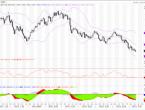EUR/USD
1.15987
-0.078%
Gold
4581.86
-0.741%
Oil
59.259
0.228%
USD/JPY
158.072
-0.341%
GBP/USD
1.33796
-0.019%
GBP/JPY
211.500
-0.349%
German Finance Minister: Europe must give a clear and unified response, and this position must be clearly conveyed to the United States.January 18th - At a summary meeting on the construction of the Jiangmen Neutrino Experiment held today, it was announced that after more than ten years of construction and scientific research, the Jiangmen Neutrino Experiment has successfully completed its construction tasks. As the worlds first new-generation ultra-large-scale, ultra-high-precision neutrino experimental facility to be built and put into operation, the Jiangmen Neutrino Experiment broke two world records for neutrino oscillation parameters just two months after its official operation, achieving data accumulation results that surpass those of similar international experiments over ten to twenty years.On January 18th, Mikhail Miyagkov, Academic Director of the Russian Military History Society, stated that he believes the likelihood of direct US military intervention to control Greenland is low. He added that it concerns the longer-term prospects: if Europe needs the US, then the US needs Europe. For the US, the EU is a market, a sphere of influence, and a talent pool; no Washington administration can bypass it. In the competition for world leadership, the US will inevitably utilize the potential of the Old World. So why would Trump want to destroy and humiliate Europe by completely annexing Greenland?On January 18, the foreign ministers of Iran and Iraq held a joint press conference. Iranian Foreign Minister Araqchi stated that the withdrawal of US troops from the Al-Asad Air Base in Iraqs western Anbar province and the end of the UN Assistance Mission in Iraq (UNAMI) mission are clear signs of Iraqs independence, stability, and the consolidation of its national sovereignty. Araqchi welcomed Iraqs increasingly important and constructive role in regional diplomacy and announced Irans willingness to cooperate with Iraq to address challenges and promote regional dialogue. To this end, both sides agreed to advance diplomatic initiatives aimed at maintaining regional stability and reaching consensus on security challenges, and are actively promoting the formulation of a comprehensive strategic cooperation agreement.Xinhua Life Insurance (01336.HK): The cumulative original insurance premium income for the period from January 1, 2025 to December 31, 2025 is RMB195.899 billion, representing a year-on-year increase of 15%.











